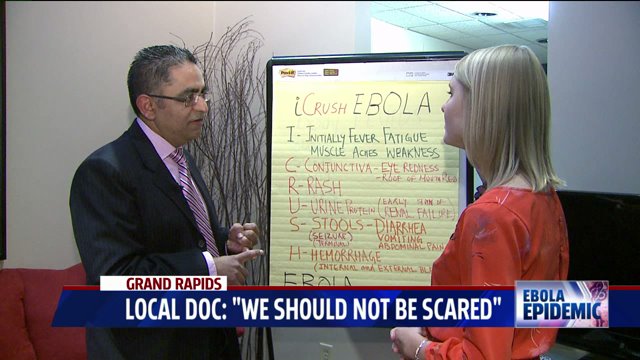GRAND RAPIDS, Mich. – On Sunday, a healthcare worker with the Texas Health Presbyterian Hospital, who provided care for the patient who died from Ebola Oct. 8, has tested positive for Ebola.
The Centers for Disease Control and Prevention (CDC) called this Ebola epidemic the largest in history. At this point, more than 4,000 people have died; deaths at a rate of one in two people who have come down with the virus.
Yet, turning to social media, pictures surfacing may be making the threat of Ebola feel even more widespread. Dr. Harpreet Singh, a medical doctor with VitalChecklist LLC based out of Grand Rapids, told FOX 17 that the threat of Ebola is only real if you are in close contact with anyone diagnosed with Ebola.
“Yes, there is a scare, but if you are not in close contact to the body secretions of the infected person, you should not be really scared about this,” said Dr. Singh.
Dr. Singh also told FOX 17 healthcare precautions in place should be “good enough.” Between wearing protective clothing and consistently washing hands, Dr. Singh believes healthcare professionals should not be worried.
“If we follow the universal precautions of wash-in and wash-out, if we are washing our hands when we are touching a patient and coming out of the room and we are washing again, and using alcohol sanitizer, and using all of the protective gear we have, we should not be really scared about (Ebola),” said Dr. Singh.
But the Ebola Virus is tricky. Dr. Singh said there is no treatment other than experimental medication. Then, Ebola has an incubation period from two to 21 days, or the amount of time before symptoms can show themselves. On top of that, Ebola’s initial symptoms can look like the flu, which Dr. Singh said may be fueling the hysteria.
“The most important thing is the initial fever, fatigue, you can get muscle aches and weakness: when this happens, the patient gets worried, ‘do I have the flu or not?’” said Dr. Singh. “They might have some cough, they might be sneezing and say, wow, do I have Ebola or do I have the flu?”
Starting this week, five major U.S. airports will use enhanced Ebola screening: New York’s JFK, Washington-Dulles, Newark, Chicago-O’Hare, and Atlanta International Airports. According to the CDC these airports receive almost 95 percent of travelers coming from Ebola-affected West African countries.
Officials at Gerald Ford International Airport said they are not increasing safety protocols due to Ebola.
For more information on how to stay protected if you are traveling see the CDC’s website.



